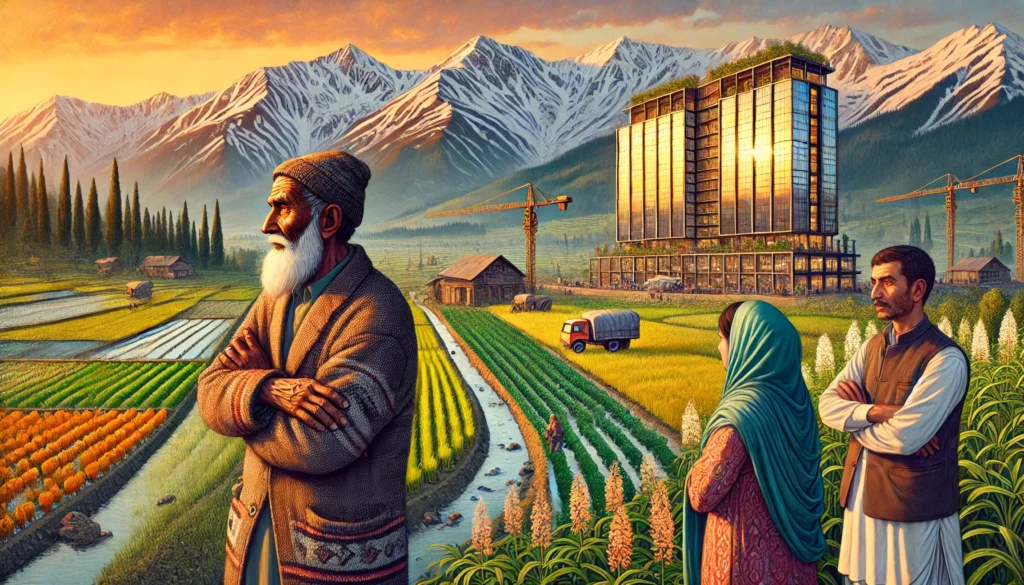The recent expansion of market forces in Jammu and Kashmir has been constrained by a limited scope for market investment in industrial and production setups. In this region, the market’s influence remains largely confined to service provision, with minimal impact on job creation through industrial or production sectors. While this model has contributed to some modernization, it has also raised concerns about the dignity of the people.

Dignity is an essential component of human existence. It represents the intrinsic worth of every individual and includes self-respect, the right to make choices, and the ability to live with autonomy. Dignity ensures that people are treated as ends in themselves, not merely as means to an economic goal. It recognizes that every individual, regardless of social or economic status, deserves respect and fair treatment.In India, the right to dignity is enshrined in the Constitution. Specifically, Article 21 guarantees the right to life and personal liberty, a right that has been interpreted by the Supreme Court to encompass the right to live with dignity. This legal provision asserts that every individual is entitled to a life free from exploitation, humiliation, and deprivation, thus ensuring their dignity in both public and private spheres.
The recent expansion of market forces in Jammu and Kashmir is reshaping its socio-economic landscape. While this growth promises modernization and economic development, it brings with it challenges that threaten the dignity of the local population. The push for urbanization, driven by market demands, is leading to a shift from traditional, agrarian lifestyles and close-knit communities to individualistic, urban-centric ways of life. This shift can result in the erosion of local identities and the loss of cultural heritage, both of which are integral to the dignity of individuals. The dismantling of traditional support systems and communal bonds further weakens the social fabric that supports dignity.In this new market economy, where profit and consumerism reign, individuals are often reduced to mere consumers or laborers. The commodification of human life, driven by market priorities, diminishes people’s agency and self-worth. Instead of being seen as unique individuals with inherent dignity, they are viewed primarily as tools for economic gain. This transformation in how people are perceived can strip them of their autonomy and their ability to live with respect for themselves.
The shift towards an urban, market-driven lifestyle also brings with it new pressures. The competitive nature of urban life, coupled with the loss of traditional values and community ties, can lead to feelings of alienation, inadequacy, and a diminished sense of self-worth. This psychological toll directly affects a person’s sense of dignity. When individuals are faced with the challenges of adapting to an urban environment that prioritizes individual success over collective well-being, they often struggle to maintain their self-respect and honor.
Economic vulnerability exacerbates this crisis. With precarious employment conditions, many individuals in Jammu and Kashmir find themselves working in unstable, low-paying jobs, with little job security or opportunities for upward mobility. This economic insecurity erodes their sense of control over their lives, stripping them of the ability to live with dignity. A person’s dignity is not only rooted in their self-respect but also in their ability to lead a stable and fulfilling life. The lack of economic stability and opportunities can undermine this basic human need.
The challenges posed by the expansion of market forces in Jammu and Kashmir are significant. While the region may benefit from certain economic advancements, these improvements must not come at the cost of human dignity. The transition from traditional lifestyles to urbanized ways of living, the increase in economic vulnerability, and the psychological toll of adapting to a competitive market environment all contribute to the erosion of dignity. These factors must be addressed to ensure that the people of Jammu and Kashmir are not left behind in the rush for modernization.
To safeguard the dignity of individuals in the region, it is essential to adopt a development approach that is mindful of the cultural and social fabric of Jammu and Kashmir. Policymakers must ensure that economic growth does not undermine the traditional values that define the region’s identity. By fostering inclusive and sustainable growth, it is possible to achieve modernization without sacrificing the dignity of the people. This approach would enable the region to thrive economically while preserving the right to live with dignity, as guaranteed by Article 21 of the Indian Constitution.
While market forces have the potential to bring economic benefits to Jammu and Kashmir, their expansion must be balanced with a deep respect for the dignity of the people. By promoting a development model that integrates both economic growth and human dignity, the people of Jammu and Kashmir can experience the benefits of modernization without losing the essence of who they are. Through such a balanced approach, the region can ensure that its people are not only part of an evolving market economy but also maintain their right to live with dignity and respect.
